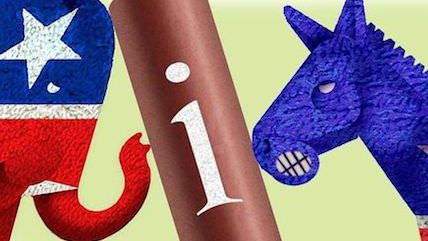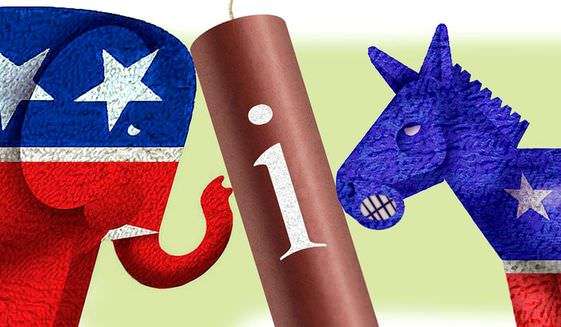Poll: Third-Party Voters Side With Democrats on Police and Foreign Policy and with Republicans on Economics


If November's election for Congress were held today, 42 percent of registered voters say they would vote for the Democratic candidate in their district, 33 percent would vote for the Republican in their district, 13 percent would vote third party, and 11 percent don't know whom they'd vote for yet, according to the latest Reason-Rupe poll.
One may notice these results diverge from Real Clear Politics' 2014 Generic Congressional Vote aggregator which finds among likely voters, 45.3 say they plan to vote Republican and 43.5 percent Democratic.
What explains the difference?
Reason-Rupe offers respondents the option to select a third-party candidate while other polls offer the two-party choices and then ask undecided voters which way they lean. (For instance, see these Fox News, and Gallup polls). There's nothing wrong with asking about only two parties, and will likely yield a more predictive result. However, offering a third-party option reveals which voters are most dissatisfied with the two-party candidate choices, and thus who is at high risk of defection come Election Day.
The fact that a third-party candidate could win or influence the election in several races (e.g. Kansas or North Carolina) demonstrates the importance of identifying the likely "defectors."
Who wants to vote third party?
Our data suggests likely third-party "defectors" might otherwise be potential Republican voters, given that other polls find the parties tied except when a third-party option is made available. But that doesn't mean these voters are Republicans either.
Third party voters tend to be disproportionately younger, male, independent, leaning left, but also lean libertarian on the size of government.
Third-party voters come from both the partisan left and right, and are slightly more representative of Independent-leaning Democrats (34% v 17% national) than Independent-leaning Republicans (18% v 10% national). Nevertheless, they tend to agree with Republicans on the size of government and are as likely as the national sample to be tea party supporters.
When it comes to attitudes toward the police, criminal justice reform, and foreign policy, third-party voters tend to side with Democrats. (See Table) These voters are less favorable of the police (61%), believe the police are not held accountable for misconduct (54%), favor restoring voting rights to non-violent drug offenders (82%), and allowing such offenders to petition a court to have their records sealed (50%).
When it comes to the US combatting ISIS, third-party voters are about as skeptical of air strikes as Democrats (28%), although a majority still favor (64%) their use. Also like Democrats, these voters (52%) oppose sending ground troops to combat ISIS.
However, on economic issues, third-party voters act more like Republicans. These voters tend to say we should pay for military action against ISIS primarily by cutting spending (41%) rather than raising taxes on the wealthy (33%), and that we should lower corporate taxes (54%). Also similar to Republicans, third-party voters say its is acceptable for a business to move states to lower its tax load (73%).
Third-party voters also align with Republicans on the size of government. In a complete reverse from Democrats, 64 percent of third-party voters prefer a smaller government offering fewer services, while 29 percent prefer larger government providing more services (29%). Similarly, 63 percent say free markets solve problems better than a strong government (33%).
Third-party voters are also the only political group in which a majority support allowing unvaccinated children to attend public schools (54%).
What does this mean?
These third-party voters, who likely pose the greatest electoral risk to Republicans, have a marked libertarian streak. They favor constraining government's economic and policing powers and are relatively less interventionist militarily. These data provide a strong indication that Republicans looking to win back votes from likely defectors may need to expand their issue priorities to include criminal justice reform, but also to moderate their positions on foreign policy.
The Reason-Rupe national telephone poll, executed by Princeton Survey Research Associates International, conducted live interviews with 1004 adults on cell phones (503) and landlines (501) October 1-6, 2014. The poll's margin of error is +/-3.8%. Full poll results can be found here. including poll toplines (pdf) and crosstabs (xls).
Editor's Note: As of February 29, 2024, commenting privileges on reason.com posts are limited to Reason Plus subscribers. Past commenters are grandfathered in for a temporary period. Subscribe here to preserve your ability to comment. Your Reason Plus subscription also gives you an ad-free version of reason.com, along with full access to the digital edition and archives of Reason magazine. We request that comments be civil and on-topic. We do not moderate or assume any responsibility for comments, which are owned by the readers who post them. Comments do not represent the views of reason.com or Reason Foundation. We reserve the right to delete any comment and ban commenters for any reason at any time. Comments may only be edited within 5 minutes of posting. Report abuses.
Please to post comments


So, it is the stupid economy...
Yeah, and what is the Democrat view on the police state again?
food,taxes ,rape on campus,global warming,plastic bags,school zero tolerance and lunches,need I say more
And yet, from what little I follow of US election results, they seem to vote D instead of R, or vice versa.
Maybe because there is no difference between the parties in foreign policies, so it comes down t domestic policies, where the biggest differences are tepid support for Obamacare vs bullshit claims to repeal it, and support of gay marriage and abortions vs hatred of minorities and disgust with abortions.
In gut feelings, I'd say it comes down to Dems seeming more tolerant who are for some things and Reps coming off as shrill haters who are against everything.
If I were the GOP magic wand waver, I'd tell them to stop hating on everything and instead actually be for something -- like limited government, limited overseas adventures, and limited police bullying. But then, if I had a magic wand, I'd smote all politicians and laugh.
Indeed why the great discrepancy?
By the numbers from Reason Poll, the Democrats are due to sweep the House
/sigh/ if only I had actually read the next paragraph.
I blame old age. And the UN.
Election results are usually a better barometer of voter intentions and attitudes than the endless polling leading up to the election. If the data from any of the Reason-Rupe polling conducted in the last 10 years was valid, Gary Johnson should have succeeded Bob Barr as president with an evenly-split independent and libertarian congress, and the biggest political issue of the day would be how much free marijuana the government should distribute to gay-married couples with the surplus saved by shutting down the DOD.
The Democrats have a foreign policy? I thought they were just winging it and making it up as stuff happened?
How exactly are the Democrats different on police policy? The only people I see who give a shit about police brutality other than the victims are Libertarians. Sorry, race mongering over the occasional high profile case doesn't count.
The Democrats want the oppression to be racially fair.
I was shocked at the opinion given by most of the Raging Grannies I met in 2013 about stop & frisk: that it was a good thing, except that some of them wanted to make sure it didn't involve race profiling. These are old-age female anti-war singing enviro-hippies.